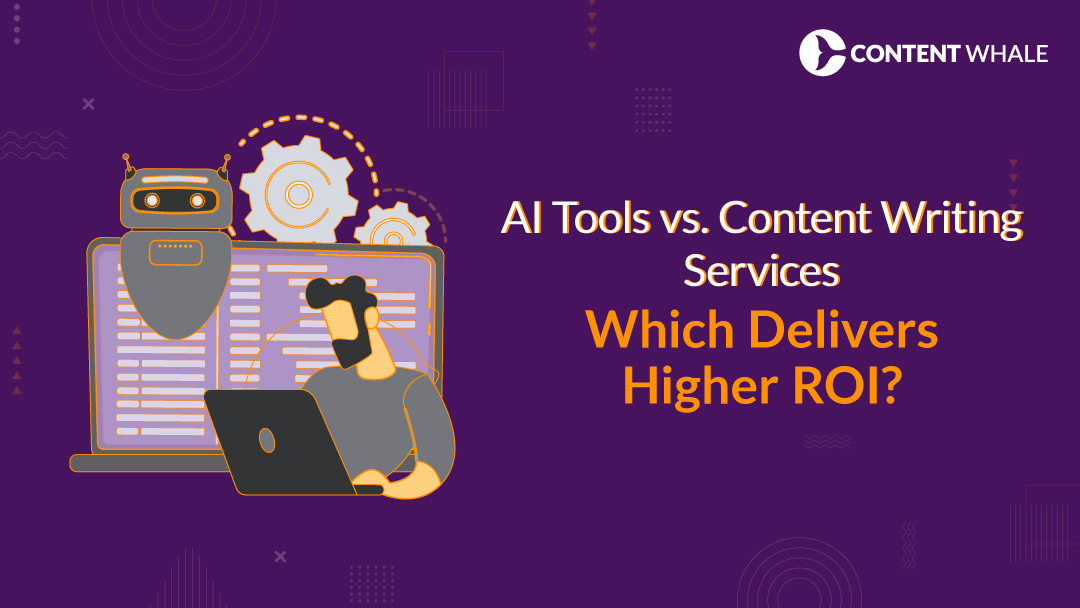When it comes to content creation, the debate between leveraging AI content writing tools and hiring content writing services is more relevant than ever. As a digital marketing enthusiast, I’ve observed firsthand the evolution of content marketing strategies and tools. Today, I want to dive into this debate, comparing the return on investment (ROI) each option offers to businesses aiming to enhance their content marketing efforts.
Understanding AI Content Writing Tools

AI content writing tools are revolutionizing the way we create content. These tools, powered by advanced algorithms and machine learning, offer the ability to generate content at an unprecedented pace. They’re particularly useful for producing high-volume, informational content efficiently and cost-effectively. –
Pros of AI Content Writing Tools:
1. Speed and Efficiency – They can churn out content much faster than human writers.
2. Cost-Effectiveness – Generally more affordable than hiring professional writers, especially for bulk content needs.
3. Scalability – Ideal for businesses looking to quickly scale their content production.
However, despite their advantages, AI tools may lack the ability to fully capture a brand’s voice or deeply engage with specific audience nuances. They sometimes fall short in areas requiring emotional intelligence, creativity, or specialized knowledge.
The Value of Content Writing Services

Pros of Content Writing Services:
1. Brand Voice Consistency – Human writers can understand and replicate your unique brand voice.
2. Engagement and Quality – Capable of creating deeply engaging and well-researched content that builds trust with your audience.
3. Expertise in Complex Topics – Professional writers can tackle specialized or technical subjects with ease, providing value and insight.
While these services offer significant advantages in terms of quality and engagement, they tend to be more expensive and slower compared to AI tools, which might be a consideration for businesses with tight budgets or urgent needs.
Balancing AI Efficiency with Human Creativity for Optimal ROI

The key to maximizing ROI in content marketing lies in finding the right balance between the efficiency of AI tools and the creativity of human writers. Here’s how you can achieve this balance:
Use AI for Drafts and Basic Content – AI tools can be used to generate initial drafts or create content for topics that are straightforward and require less emotional depth.
Enhance and Personalize with Human Touch – Have professional writers refine AI-generated content, ensuring it aligns with your brand voice and audience’s expectations.
Leverage Each for Their Strengths – Deploy AI tools for high-volume, time-sensitive projects, and reserve content writing services for high-impact, quality-driven content pieces.

The debate between AI content writing tools and content writing services doesn’t have a one-size-fits-all answer. Both have their place in a well-rounded content marketing strategy.
By understanding your specific needs, audience, and content goals, you can make an informed decision on where to invest for the highest ROI.
Remember, in the dynamic world of digital marketing, the best strategy combines the efficiency of AI with the irreplaceable creativity and empathy of human writers.
And we, at Content Whale, has cracked this only. This balanced approach will ensure your content not only reaches your audience but also resonates with them, driving engagement, trust, and, ultimately, conversions.

Q. What Are AI Content Writing Tools?
A. AI content writing tools are software applications that use artificial intelligence and natural language processing technologies to generate content. They can produce articles, blog posts, and other types of written content quickly and often at a lower cost than human writers.
Q. How Do Content Writing Services Work?
A. Content writing services employ professional writers to create custom content tailored to a client’s specific needs. These services can range from blog writing and SEO content to creative writing and technical documents, offering a personal touch and expertise that AI tools might not achieve.
Q. Can AI Content Writing Tools Replace Human Writers?
A. While AI content writing tools are improving, they cannot fully replace human writers, especially for content requiring emotional depth, nuanced understanding of a topic, or a specific brand voice. Human writers offer creativity, empathy, and the ability to engage deeply with readers.
Q. How Can Businesses Choose Between AI Tools and Writing Services?
A. Businesses should consider their content goals, budget, and the importance of quality and engagement. For high-volume, informational content, AI tools might be sufficient. For content that requires deep engagement, brand alignment, or expertise, professional writing services are preferable.
Q. What Makes Content Whale Different?
A. Content Whale stands out by blending the efficiency of AI content writing tools with the expertise and creativity of professional writers. This approach allows Content Whale to offer scalable, high-quality content solutions that are cost-effective and tailored to meet the diverse needs of businesses.
Q. How Can Content Writing Improve SEO?
A. Quality content writing can significantly improve SEO by incorporating relevant keywords, providing value to readers, and encouraging engagement. Both AI tools and professional services can contribute to SEO efforts, but the depth, quality, and relevance of content created by humans are often more effective in driving long-term SEO success.
Q. Is It Cost-Effective to Use AI Writing Tools?
A. AI writing tools can be cost-effective, especially for generating large volumes of content or drafts quickly. However, the cost-effectiveness depends on the quality required and the purpose of the content. For more specialized or brand-centric content, investing in professional writing services may offer a higher ROI.
Q. How Do I Ensure Content Quality with AI Tools?
A. To ensure quality when using AI tools, consider a hybrid approach: use AI for initial drafts or content generation and then have human editors or writers review, refine, and personalize the content to meet quality standards and align with your brand voice.





